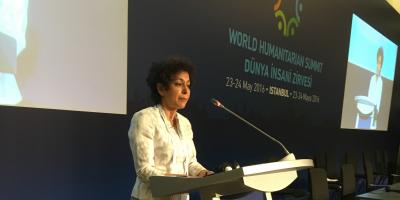
More than 9,000 participants, including more than 50 Heads of State, joined the first World Humanitarian Summit (WHS), called by United Nations Secretary-General Ban Ki-moon, to demonstrate solidarity in the face of the ‘highest level of human suffering since the Second World War.’
The declared goals of the summit were
- to re-inspire and reinvigorate a commitment to humanity and to the universality of humanitarian principles;
- to initiate a set of concrete actions and commitments aimed at enabling countries and communities to better prepare for and respond to crises, and be resilient to shocks;
- to share best practices which can help save lives around the world, put affected people at the center of humanitarian action, and alleviate suffering.
A key conclusion of a report commissioned to inform the event, and for which 23, 000 people in more than 150 countries were consulted, stated that ‘minimizing human suffering and protecting civilians requires strengthening compliance with international law.’
Serious violations of international humanitarian and human rights law are being widely committed in today’s armed conflicts; they include direct attacks against civilians and the wounded and sick, indiscriminate attacks, starvation, rape, torture and arbitrary arrest and detention.
In a plenary statement to the WHS, IDLO Director General Irene Khan, emphasized that ‘the rule of law, properly understood and applied, is essential for ensuring the rights of all those in need of humanitarian protection – civilians, refugees, migrants and the displaced – as well as enabling humanitarian workers to carry out their work in safety and in conformity with humanitarian principles.’
‘The WHS,’ she noted, ‘provides an important opportunity to recognize that investing in the rule of law is as much as part of the humanitarian agenda as providing food, water, shelter and health services.’
A High-Level Leaders’ Roundtable on ‘Upholding the Norms that Safeguard Humanity’, in which Ms. Khan also participated, provided an opportunity for IDLO to engage with government leaders and other stakeholders in promoting rule of law and access to justice in humanitarian settings. The roundtable focused on the need for practical implementation of relevant international legal obligations and explored concrete measures to strengthen protection.
‘At the heart of international humanitarian law (IHL) lies the protection of civilians, of detainees, of the wounded and sick, and of others not participating in hostilities,’ Peter Maurer, President of the International Committee of the Red Cross, told the roundtable.
‘IHL is principled but also pragmatic and practical: it does not rule out war, it sets limits to its conduct,’ he explained. ‘But law can only ever be a means to an end. Law is never an end in and of itself. IHL can be a formidable instrument if it is applied in good faith, and continually interpreted and developed to match new challenges.’
Echoing these comments, Ms. Khan told the roundtable that ‘the international legal framework, constructed with great care over the past century, provides a solid basis for humanitarian action. Unfortunately, that legal architecture is today often disregarded, and showing some signs of distress.’
Highlighting the importance of investing in the justice sector to protect and empower people, especially the most vulnerable and marginalized, Ms. Khan added that ‘developing the capacity of legal and justice systems is critical for effective humanitarian response.’ But she stressed that ‘institutions alone are not enough. People must be made aware of their rights so that they are able to claim them.’
The WHS also called attention to the necessity to mobilize resources on the scale required to address the alarming needs created by armed conflict, natural disasters, climate change, refugee situations and migration. Acknowledging that the rule of law is rarely seen as a priority among other pressing needs, Ms. Khan highlighted that ‘the more governments and the international community invest in the rule of law, the better equipped they will be to protect and assist people during humanitarian crises.’
Along with UN Member States and other stakeholders, IDLO presented concrete, measurable commitments to strengthen humanitarian action. Ms. Khan announced a number of specific individual commitments on behalf of IDLO designed to strengthen compliance with international law in practice and to promote the protection and rights of women and girls in humanitarian situations.
Download United Nations Secretary-General's Report for World Humanitarian Summit below.
Video: Irene Khan at the WHS


